The Cane Corso is an ancient Italian dog breed known for its distinctive appearance and loyal, protective nature. With a muscular build and a short, dense coat, these dogs require regular exercise and a balanced diet to maintain excellent health.
While they can adapt well to family life, early socialization, and consistent training are essential. Common health issues include hip dysplasia and bloat.
You'll forge a strong bond with your Cane Corso by understanding their unique needs and providing proper care. As you explore further, you'll discover effective training techniques and ideal living conditions to guarantee a fulfilling life together.
Ancient Italian Roots
The Cane Corso, a majestic and powerful breed, traces its roots back to ancient Italy. This breed's lineage history is deeply intertwined with the cultural significance of the Italian people. Throughout the centuries, regional variations of the Cane Corso have emerged, each with unique characteristics and traits.
The breed's development can be traced back to its ancient origins, where it was primarily used for hunting and guarding. As you explore the history of the Cane Corso further, you'll discover that this breed has played a significant role in shaping the landscape of Italian dog breeds.
From its early beginnings to its modern-day counterparts, the Cane Corso has undergone a fascinating journey of evolution and adaptation. By understanding the breed's rich history and cultural significance, you'll better appreciate this magnificent dog and its essential role in Italian society for centuries.
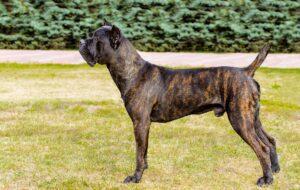 Distinctive Physical Traits
Distinctive Physical Traits
Moving from the Cane Corso's historical roots to its physical characteristics, you'll immediately notice this breed's distinctive features. This dog is large, with a muscular body build that speaks to its strength and agility.
Its pointed ears and alert expression contribute to a striking appearance, giving the impression of a dog always ready for action. The Cane Corso's physique isn't just for show; it's a witness to the breed's history as a working dog, capable of performing various tasks from hunting to guarding.
Combining these physical traits results in a visually impressive and competent dog, a true embodiment of form following function.
Loyal and Protective Nature
Cane Corso dogs are renowned for their unwavering loyalty and protective instincts. These majestic canines form strong bonds with their families and will go to great lengths to safeguard their safety. With proper obedience training and socialization from an early age, you can harness their natural guarding behavior and watchdog capabilities while maintaining a well-balanced temperament.
It's vital to understand that Cane Corsos have territorial solid instincts, which can lead to overprotectiveness if not correctly managed. Exposing your cane corso to various people, animals, and environments during their formative months will help them develop into confident and discerning protectors who can accurately assess potential threats.
Effective Training Techniques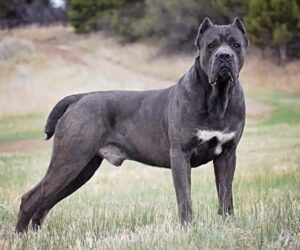
Effective training techniques form the foundation of a well-behaved and responsive Cane Corso. Socialization techniques are vital for your Cane Corso puppy. Exposing them to various people, animals, and environments helps prevent aggression and fearfulness.
Enrolling in obedience classes offers numerous benefits, including learning essential commands and proper behavior in a structured setting.
Reward-based training is efficient for this breed. Using treats and praise, you'll reinforce positive behaviors and quickly gain your dog's trust and respect. Consistency in training is critical to success. Establish clear rules and boundaries from day one and ensure all family members follow them.
Early puppy training sets the stage for a well-adjusted adult dog. Begin basic obedience and socialization as early as eight weeks old. Remember, patience and persistence are essential. With dedication and the proper techniques, you'll have a loyal and obedient Cane Corso that's a joy to be around.
Exercise Requirements
Regular exercise is indispensable for maintaining the health and well-being of your Cane Corso. These dogs require substantial daily activity to keep them physically and mentally fit. Controlled exercise regimens are vital, particularly during their growth stages, to prevent overexertion and support healthy development.
Outdoor playtime needs are significant for the Cane Corso, which thrives in spacious environments where they can run and play freely. However, it's imperative to balance this with proper exercise pacing, especially in puppies, to avoid strain on developing joints and muscles.
Leash training is crucial for this breed. Given their strength and sometimes willful temperament, ensuring your Cane Corso is well-behaved on a leash is critical for safety during walks. This training should start early and be consistent to be effective.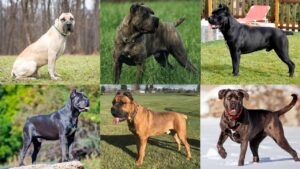
Incorporating various activities, such as walking, running, and playtime, into your Cane Corso's routine will help keep them happy and healthy and efficiently fulfill their exercise requirements.
Maintaining a consistent grooming routine is essential for Cane Corso's overall health and well-being. Regular brushing helps remove loose hair and distributes natural oils, keeping their coat healthy and shiny.
Aim to brush your Cane Corso at least once a week, increasing frequency during shedding seasons to manage the increased hair loss.
Baths should be given every 6-8 weeks or as needed, using a gentle dog shampoo to avoid stripping their coat of essential oils. When bathing, thoroughly rinse to prevent skin irritation.
Pay attention to your Cane Corso's nails, trimming them every 4-6 weeks to maintain a healthy length. Overgrown nails can cause discomfort and affect their gait. In addition to these basics, regularly check their ears and teeth, cleaning as necessary.
Common Health Issues
Like many large breed dogs, cane corsos are prone to specific health issues that owners should be aware of. Hip dysplasia is a common concern, leading to arthritis and mobility issues. Regular check-ups and maintaining a healthy weight can mitigate this risk.
Due to their short muzzles, this breed can also be affected by respiratory problems, including brachycephalic syndrome. Skin allergies, often caused by environmental factors or food sensitivities, are another issue you might encounter.
Neurological conditions, such as epilepsy, have been reported in some Cane Corsos, requiring careful management and veterinary attention. Finally, heart disease, particularly dilated cardiomyopathy, can be a concern in this breed. Regular cardiac screenings and a heart-healthy diet can help preserve your Cane Corso's cardiovascular well-being.
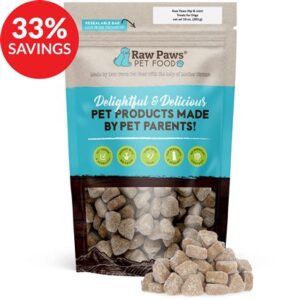 Optimal Nutrition
Optimal Nutrition
For ideal nutrition, feeding your Cane Corso a balanced diet that supports their unique health needs is pivotal. A high-quality protein source should be the foundation of their diet, as it provides the essential amino acids necessary for muscle development and repair.
You should also monitor your Cane Corso's calorie intake to maintain a healthy weight, as obesity can lead to various health issues. Vitamin supplements may be beneficial to guarantee your dog receives all the necessary nutrients but consult with your veterinarian to determine the appropriate dosage.
Remember your Cane Corso's hydration needs; water is indispensable for digestion, nutrient absorption, and temperature regulation. A balanced diet tailored to your Cane Corso's specific requirements will help promote prime health and well-being.
Adapting to Family Life
Integrating a Cane Corso into your family life requires careful planning and consideration. This breed's socialization needs are paramount; it can become overly protective or aggressive without exposure to various people and environments from an early age.
Training for children is also essential, as these dogs are large and powerful, and kids must learn how to interact with them safely. A Cane Corso can adapt to apartment living, but its activity level requires regular, vigorous exercise to keep it content.
Managing a Cane Corso's territorial instincts is indispensable. They're known for their guarding instincts, which can be an asset but also require careful management to verify they don't become a liability.
Here are vital considerations to visualize their integration into family life:
- Picture your Cane Corso on a structured daily walk, burning off energy and socializing with neighbors.
- Imagine regular training sessions where your children learn to command the dog safely, fostering respect and understanding.
- Envision creating a designated space in your home where your Cane Corso can retreat, guaranteeing they've their territory within your shared living environment.
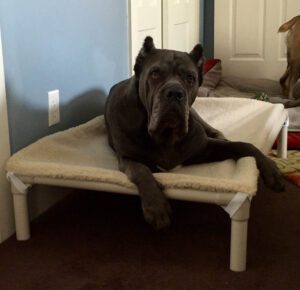 Ideal Living Conditions
Ideal Living Conditions
Understanding the ideal living conditions for a Cane Corso is pivotal in ensuring a harmonious relationship between your family and your pet. Given their large size and energetic nature, these dogs require ample space to move and exercise.
A spacious home with a yard is preferable, though they can adapt to apartment living provided they receive sufficient exercise.
Yard size needs vary, but a securely fenced area for daily activities is essential.
When considering the indoor/outdoor balance, Cane Corsos are pretty adaptable. They enjoy being outdoors but value time spent with their family indoors.
However, their tolerance to climate extremes is moderate; they can withstand cold weather if provided with adequate shelter, but they're not suited to prolonged exposure to heat.
Noise level considerations are also important. Cane Corsos are generally not excessive barkers, but their deep, loud barks can be disruptive if not managed properly. Early training and socialization can mitigate unwanted behaviors.
Balanced living conditions, regular exercise, and mental stimulation contribute considerably to a well-adjusted and happy cane corso.
Frequently Asked Questions
How Much Does a Cane Corso Puppy Typically Cost?
The cost of adopting a Cane Corso puppy can vary depending on your source. Adoption fees from rescue organizations are generally lower, typically ranging from $300 to $500.
However, prices can fluctuate significantly if you go through a breeder due to factors such as the breeder's reputation, the puppy's lineage, and your geographic location. On average, you can expect to pay between $1,500 and $4,000 for a Cane Corso puppy from a reputable breeder.
Remember that Cane Corso litters are relatively small, usually averaging around 6 to 8 puppies, which can influence availability and pricing.
Are Cane Corsos Good With Other Pets?
With early socialization, Cane Corsos can get along well with other pets. Their temperament traits vary, but meeting their exercise requirements and grooming needs while tackling training challenges will help them coexist peacefully in your home.
What Is the Average Lifespan of a Cane Corso?
Your Cane Corso's average lifespan is 9-12 years. They require ample exercise and regular grooming and may face health issues like hip dysplasia. Their protective temperament and intelligence can pose training challenges, but with dedication, they make excellent companions.
Do Cane Corsos Drool a Lot?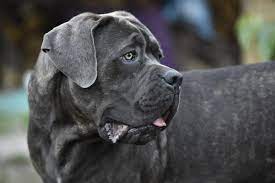
Yes, your Cane Corso may drool, especially after eating or drinking. It's a breed-specific trait that you'll need to manage with regular grooming. They also require plenty of exercise, socialization training, and care to prevent potential health concerns.
Are Cane Corsos Prone to Separation Anxiety?
Cane Corsos can experience separation anxiety due to their strong bonds with their owners. Proper training, socialization, and meeting their exercise needs are vital. Grooming is minimal, but their personality traits require an experienced, committed owner.
Final Thoughts
You've learned about the Cane Corso's rich history and distinctive traits. This loyal breed can adapt well to family life with proper training, exercise, and nutrition. While they may face health issues, your understanding and care will help them thrive in the right living conditions.
Resources:
- American Kennel Club (AKC)
URL: https://www.akc.org/dog-breeds/cane-corso/ - The Cane Corso Association of America (CCAA)
URL: https://www.canecorso.org
The Article: Cane Corso Dog Breed: Essential Facts Was Found On https://happypetsgroomingtable.com/
The Article Cane Corso Dog Breed: Essential Facts First Appeared ON
: https://ad4sc.com






It’s fascinating to delve into the rich history of the Cane Corso and how its Italian roots contribute to its unique characteristics. I’ve always admired how culture can shape a breed’s temperament and behavior. For instance, the Cane Corso’s protective nature could be linked to its historical role as a guardian and protector in Italian households.
You’ve touched on such a key aspect of the Cane Corso’s personality. Their protective nature is fascinating when you consider how deeply intertwined it is with Italian culture. Historically, these dogs were not only guardians but also played roles in agriculture and even as hunting companions. This blend of responsibilities likely shaped their temperament to be both devoted and vigilant.
You’ve hit the nail on the head! It’s fun to think about how the Cane Corso’s personality might reflect those Italian family values. Picture this: centuries ago, if a would-be intruder dared to approach a cozy Italian villa, they weren’t just facing a barking dog, but a four-legged bouncer with a fierce sense of loyalty—serving pasta and a side of intimidation.
“Click here for laughs—your giggle muscles will thank you!”
https://oldicom.net/octopus
I agree, it really is interesting how the Cane Corso’s Italian heritage influences its traits and behaviors. Their role as guardians certainly ties back to that historical context, where families relied on them for protection and companionship. It’s fascinating to think about how a breed’s purpose in society can shape its temperament over generations.
You make a great point about how the Cane Corso’s historical role has shaped its traits. It’s truly captivating to see the evolution of a breed tied so closely to its environment and purpose. I’ve always thought about the connection between a dog’s lineage and the behaviors we see today. It’s like a mirror reflecting the needs and values of the society they were bred in.
I found some insightful information about how the Cane Corso’s Italian roots really shape their behavior and purpose as guardians—definitely worth a read if you’re curious about the breed’s fascinating history and temperament.
‘Important Facts About the Cane Corso Dog Breed’
https://oldicom.net/important-facts-about-the-cane-corso-dog-breed/.
You bring up a great point about the Cane Corso’s historical role. Their lineage as protectors is fascinating, especially when you consider how that has shaped their instincts and social behaviors today. It’s interesting how these dogs have evolved alongside families, developing those strong bonds that we see now. Even in modern settings, their natural guarding instincts can be both impressive and comforting. It makes you appreciate how a dog’s environment and purpose can influence its personality. Have you noticed specific traits in Cane Corsos that stand out to you?
Absolutely! If you’re interested in exploring more about the Cane Corso’s traits and history, check out this insightful resource that dives deeper into their fascinating heritage.
https://oldicom.net/octopus
You bring up such a great point about the Cane Corso’s Italian heritage. It’s like each dog carries a piece of history with them, shaped by generations of what their intended role was in society. When you think about it, these dogs were bred in Italy as working dogs—protectors of livestock and families. That kind of responsibility surely influences their traits, right?
“Absolutely! If you’re interested in exploring more about the Cane Corso’s unique traits and their historical significance, check out this insightful resource!”
https://oldicom.net/quillbot
It really is interesting to see how deeply intertwined a breed’s characteristics are with their historical roles. The Cane Corso, for instance, embodies that protective spirit so strongly, which likely stems from its origins as a guardian and hunting dog in Italy. It’s like the breed carries centuries of tradition and purpose in its DNA.
It really is fascinating how the history of a breed shapes its traits. With the Cane Corso, I think that protective spirit is so evident in their demeanor; they just seem to carry themselves with a sense of purpose, don’t they? I sometimes wonder how modern lifestyles influence these traditional roles. For instance, many people today adopt breeds like the Cane Corso as family pets rather than working dogs, yet they maintain that instinctual drive to protect their loved ones.
You bring up such a compelling point about the Cane Corso and their protective instincts. It’s interesting how their history as guardians and hunters shapes their demeanor even in a family environment. I’ve noticed that they hold themselves with not just confidence, but an air of vigilance; it’s almost like they’re always on the lookout for anyone who might need their help or protection.
You’ve really hit the nail on the head with your observations about the Cane Corso. Their history as guardians has undoubtedly shaped their personality in such a unique way. I’ve often thought about how that guardian instinct manifests itself in daily life, especially in a family setting. It’s fascinating how they can switch between being playful companions and vigilant protectors.
“Absolutely! Their innate vigilance truly makes them remarkable companions. If you’re interested in learning more about the Cane Corso’s unique traits and how to nurture their protective nature, check out this insightful guide.”
https://oldicom.net/octopus
You’ve touched on such an interesting point about the Cane Corso and how the breed’s history shapes its traits. It’s true; their protective nature does give them a commanding presence, which can be both comforting and a bit intimidating at times. I’ve always wondered how these instincts adapt when they become part of a family rather than serving their traditional roles as working dogs.
I came across some interesting insights about the Cane Corso’s history and how it shapes their protective instincts, which really adds depth to the conversation about their role in modern families.
‘Important Facts About the Cane Corso Dog Breed’
https://oldicom.net/important-facts-about-the-cane-corso-dog-breed/.
You bring up a really interesting point about the Cane Corso’s protective nature and how it ties back to their historical roots. It’s true that these dogs have such a commanding presence, and that sense of purpose you’re talking about really comes through in their interactions. They’ve been bred for centuries to guard and protect, so it’s no wonder those instincts linger, even when they’re living as family pets.
Absolutely! If you’re interested in learning more about the Cane Corso’s unique traits and how they adapt to modern living, check out our in-depth guide here.
https://oldicom.net/webilaro
You’ve hit the nail on the head with that observation. The history of a breed really does shape how they are today, and the Cane Corso is a perfect example of this. When you think about their past as guardians and hunters in Italy, it makes sense why they developed such a strong protective instinct. It’s like every generation of these dogs came with the training and experiences of their ancestors embedded in their behavior.
Absolutely, the Cane Corso truly reflects its rich history and purpose. If you’re interested in learning more about this remarkable breed and how to care for them, check out our comprehensive guide!
https://oldicom.net/webilaro
You bring up a great point about the Cane Corso’s historical significance and how those traits manifest in its behavior today. It’s fascinating to think about how much a dog’s environment and purpose can shape its instincts and personality. The Cane Corso, with its strong guarding instincts, really does seem to embody that blend of loyalty and protective nature.
You’ve touched on something that truly strikes at the core of understanding the Cane Corso. Their history as working dogs—protectors of property and family—lays a foundational layer that can’t be overlooked. This breed wasn’t just a companion but a necessary part of life for many people in Italy, where their instincts as guardians were finely honed through generations.
“I’m glad you found that insight intriguing! If you’re interested in learning more about the Cane Corso’s unique traits and how they can enrich your life, check out this resource.”
https://oldicom.net/octopus
You make a great point about how a breed’s traits are so tied to their history. The Cane Corso really does showcase that protective nature, and it’s fascinating to think about what that means for the modern relationships we have with our pets. Their lineage as both guardians and hunters definitely shapes their personality today.
Given your interest in the Cane Corso’s rich history and protective nature, I think you’ll find this article offers some great insights into the breed’s fascinating traits and background.
‘Important Facts About the Cane Corso Dog Breed’
https://oldicom.net/important-facts-about-the-cane-corso-dog-breed/.
You’ve hit the nail on the head with how a breed’s history influences its temperament. The Cane Corso, with its roots as both a protector and a hunter, really does have this unique blend of loyalty and strength that shapes how they interact with us. It’s interesting to think about how these characteristics translate into their modern roles as family companions.
Thanks for your thoughtful comment! If you’re intrigued by the Cane Corso’s history and traits, I highly recommend checking out this article for even more fascinating insights: [Important Facts About the Cane Corso Dog Breed](https://oldicom.net/important-facts-about-the-cane-corso-dog-breed/). I think you’ll really enjoy it!
https://oldicom.net/quillbot
It’s true that the Cane Corso’s history dramatically influences its temperament, blending that natural loyalty with a protective instinct that can be quite remarkable in family dynamics. These dogs have such a fascinating lineage—coming from ancient Roman ancestry, they really embody a mix of strength and compassion.
I completely agree with you—it’s compelling to see how deeply intertwined the Cane Corso’s history is with Italian culture. Their protective instinct certainly reflects their roots as guardians of livestock and property. I think it speaks volumes about how breeds were shaped by their environments and the specific needs of their communities.
I find that connection between dog breeds and their environments really fascinating, too. The Cane Corso, with its strong protective instincts, really exemplifies how animals adapt to the demands of the communities they are part of. It’s interesting to think about how different roles—like those of herders or protectors—shaped not only their physical traits but also their temperaments.
I completely agree—it’s fascinating how closely tied the traits of dog breeds are to their environments and roles within those communities. The Cane Corso is a prime example; their protective instincts seem to stem not just from their lineage but from the specific needs of the people who have bred and cared for them over generations. It raises interesting questions about human influence on animal behavior and even the way we live together.
It’s fascinating, isn’t it? The way a breed like the Cane Corso embodies its history and purpose is a remarkable reflection of how deeply intertwined animals are with human culture. Their role as guardians certainly speaks to their protective instincts, which can be seen not just in their demeanor but in how they form bonds with their families.
You’ve really hit on something special about the Cane Corso and its connection to our lives. When you think about their history, it’s amazing how they’ve evolved from being working dogs, often used for guarding properties and livestock, to beloved members of our families today. Their protective instincts are not just instinctual; they’ve been honed over generations alongside humans, which makes their behavior fascinating to study.
You’ve highlighted such an important aspect of the Cane Corso’s character and history. These dogs aren’t just pets; they truly carry the stories of their past in their actions and interactions with us. Their background as protectors is reflected not only in their physicality but also in how they instinctively look after their families. It’s intriguing to observe how this breed functions almost like a living history book, reminding us of the roles animals have played alongside humans throughout time.
Absolutely! If you’re interested in learning more about the Cane Corso’s unique traits and how to nurture their guardian instincts, check out this insightful guide.
https://oldicom.net/octopus
You’ve touched on something really interesting—the connection between a breed and its cultural background. The Cane Corso’s protective nature is a perfect example of how a dog’s role in society can shape its instincts and traits over generations. In Italy, where they were often seen as guardians of homes and livestock, this sense of duty and alertness became ingrained in their behavior.
You’ve hit on something really interesting with the Cane Corso and the way its roots influence its temperament. When you look at the history of this breed, it’s not just about the protective nature but also the specific lifestyle and needs of the communities it was bred to serve. In Italy, many families relied on these dogs not just for protection but also for work on farms or even to help with livestock. The result? A breed that combines loyalty with intelligence and a strong work ethic, which is pretty unique.
You bring up some great points about the Cane Corso’s background. It’s fascinating how their roles evolved from being farmhands to guardians—essentially the Swiss Army knives of their communities. In the past, these dogs were multi-taskers, juggling the demands of work while standing guard. It really shaped their personality traits.
It’s true that exploring the history of the Cane Corso reveals so much about how culture and breed characteristics intertwine. I find it interesting how specific roles in society, like guarding and protecting, shape not just behavior but also the way a breed is perceived. It’s clear that the Cane Corso’s protective instincts run deep, and that makes them particularly cherished as family companions.
I recently came across an insightful piece on the Cane Corso that dives deep into how its Italian heritage has shaped its traits, and I thought you might appreciate the connections it draws between culture and temperament.
‘Important Facts About the Cane Corso Dog Breed’
https://oldicom.net/important-facts-about-the-cane-corso-dog-breed/.
I completely agree with you about the Cane Corso’s fascinating history and the way culture shapes a breed’s temperament. It’s interesting to think about how practical roles influence the characteristics we see in dogs today. The Cane Corso’s lineage as a guardian makes it particularly attuned to the dynamics of family and home life.
I recently came across some insightful facts about the Cane Corso that really deepen the understanding of its Italian heritage and how it influences the breed’s behavior and temperament.
‘Important Facts About the Cane Corso Dog Breed’
https://oldicom.net/important-facts-about-the-cane-corso-dog-breed/.
It’s fascinating to delve into the history of the Cane Corso and appreciate how intertwined this breed is with Italian culture. Their ancient roots not only contribute to their striking appearance but also to their loyal temperament, which has been cherished across generations. I’ve found that the deep bond formed with this breed often stems from understanding their unique needs, as you’ve highlighted.
It’s great to hear your thoughts on the Cane Corso. Their deep ties to Italian history really do shape not just their looks but also how they behave and interact with people. The breed’s journey from ancient Roman times, where they served in various roles from hunting to guarding, certainly adds a rich layer to their personality today.
“Discover insights and strategies that can elevate your journey—explore more here.”
https://oldicom.net/quillbot
It’s fascinating to consider how the history of the Cane Corso influences their behavior and temperament today. The roles they played in ancient Rome really highlight their versatility as working dogs, and it makes me think about how dogs often mirror the environment and culture they grow up in.
It really is intriguing how the Cane Corso’s history shapes their behavior and temperament today. I often think about how those early roles as hunting and guarding dogs must have instilled a certain confidence and loyalty in them that persists. Their adaptability in different environments really speaks to their intelligence and emotional awareness, making them such a strong bond for families.
I recently came across some interesting insights about the Cane Corso that delve into how their rich history shapes their behavior today, which really ties into your thoughts on their versatility as working dogs.
‘Important Facts About the Cane Corso Dog Breed’
https://oldicom.net/important-facts-about-the-cane-corso-dog-breed/.
You’ve touched on an interesting aspect of the Cane Corso—their history certainly shapes their presence and behavior today. I often think about how our environment and roles influence not just breeds of dogs, but the species as a whole. The Cane Corso’s lineage as a protector and hunter mirrors the protective instincts many of us cultivate in our lives, whether in caring for loved ones or standing guard over what we believe in.
You’ve really highlighted something profound about the Cane Corso’s role in our lives. Their origins as guardians and hunters do resonate with a lot of us striving to protect our families and ideals in a rapidly changing world. It’s fascinating how behaviors in animals can mirror human instincts.
You bring up an interesting point about the connection between Cane Corsos and our human instincts. It’s fascinating how these dogs, with their history as guardians and hunters, reflect our own desires to protect what we hold dear in such a complex world.
“Absolutely, it’s incredible to see how these beautiful dogs embody our protective instincts! If you’re interested in exploring more about the Cane Corso’s unique qualities and how they can enrich our lives, check out this resource!”
https://oldicom.net/quillbot
You’ve brought up some interesting points about the Cane Corso’s historical significance. It’s fascinating to think about how those ancient roles have influenced their temperament today. The breed really does seem to carry that regal presence and strong loyalty that comes from their deep roots in guarding and hunting.
Your exploration of the Cane Corso’s rich history and unique needs resonates deeply with anyone who has experienced the bond of companionship with a dog. The emphasis on early socialization and consistent training truly highlights the responsibility that comes with such a magnificent breed.
It’s great to hear that my exploration of the Cane Corso’s history and needs struck a chord with you. The bond we share with our dogs is incredibly special, and every breed brings its unique flavors to that experience.
Thank you for your thoughtful comment! If you’re interested in learning more about how to nurture this amazing breed, check out our comprehensive guide here.
https://oldicom.net/webilaro
I completely agree – the bond we share with our dogs is one of those unique relationships that’s hard to put into words. Cane Corsos, with their rich history and loyal nature, really embody that special connection. I’ve noticed that this breed tends to form an incredibly protective attachment to their families, which can be a double-edged sword sometimes.
It’s encouraging to hear that the article resonated with you. The Cane Corso is such a remarkable breed, and delving into their history and specific needs often brings out just how much they deserve our understanding and care. That bond of companionship is something truly special—it’s a relationship built on mutual trust and respect, and it definitely adds layers to the joys and challenges of dog ownership.
I appreciate your insights on the Cane Corso! They truly are fascinating dogs, aren’t they? I often find myself marveling at their commanding presence. It’s like they could moonlight as a bouncer for an Italian trattoria—though I’m not sure how they’d feel about enforcing the “no pizza after 8 PM” rule!
The Cane Corso indeed embodies a unique blend of strength and loyalty that captivates many dog enthusiasts. Having spent time with this breed, I’ve come to appreciate their deep-rooted disposition towards family and protection. It’s interesting how their historical role as guardians has shaped not only their behavior but also their relationship with humans over the centuries.
You’ve captured something really special about the Cane Corso. Spending time with them can really change your perspective on what it means to share your life with a dog. Their blend of strength and loyalty goes beyond just their physical presence; it’s like they have this sixth sense when it comes to their families. You can see it in the way they watch over the kids or stand guard when new people come around.
It’s fascinating to learn about the Cane Corso’s rich history and its importance in Italian culture. I’ve always admired how ancient breeds like this can offer us insights into our shared past and the roles animals have played in human society.
Ah, the Cane Corso—a breed that truly embodies the phrase “don’t judge a book by its cover.” Sure, these dogs look like they could bench press a mini Cooper, but when you scratch beneath that massive brawn, you’ll find a heart of gold. I mean, who knew that behind those intimidating muscles lies a pup ready to snuggle and protect at the same time? It’s like having a personal bodyguard and a fluffy couch potato rolled into one!
You really nailed it with your description of the Cane Corso. It’s fascinating how a breed that looks so formidable can have such a gentle side. They’re often misunderstood because of that tough exterior, but once you get to know them, you discover their loyalty and affection.
“Absolutely! If you’re curious to learn more about their loving nature and unique traits, check out this insightful guide on Cane Corsos!”
https://oldicom.net/quillbot